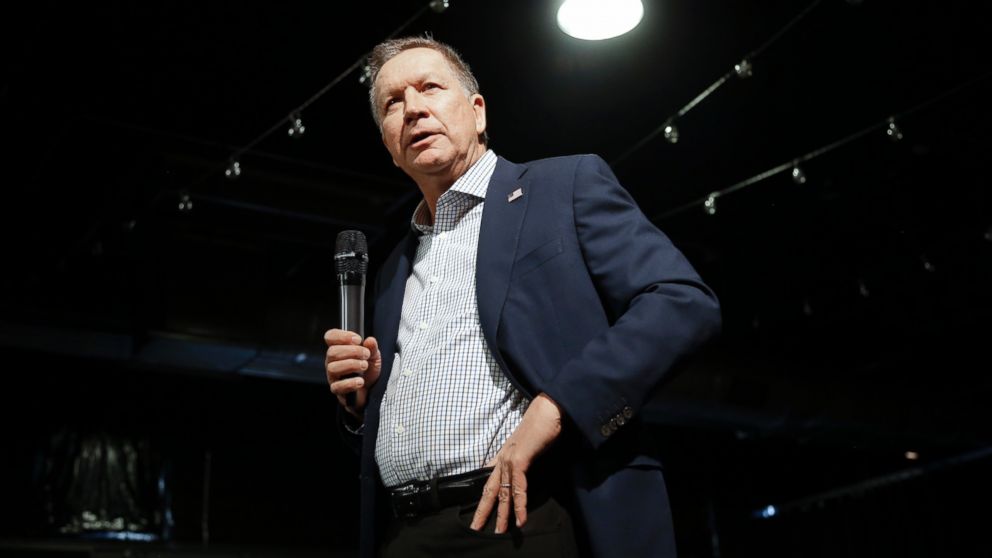Amid Calls for His Exit, John Kasich Looks to Two-Person Race
SPRINGFIELD, Mass. -- As an increasing number of establishment Republicans coalesce around one of his rivals for the Republican nomination for president, Ohio Gov. John Kasich has set his sights on March 15, a day when his campaign argues that the GOP field will be narrowed to just two contenders.
That day, Kasich aims to finish first in Ohio's GOP primary, becoming just the second person not named Donald Trump to win a statewide GOP nominating race -- unless Ted Cruz places first in his home state of Texas on Tuesday. That same Tuesday, his campaign expects fellow candidate Sen. Marco Rubio, who has drawn the support of more and more elected GOP figures, to flounder in his home state of Florida.
"It's on the 15th of March when this race narrows down, when Marco Rubio loses Florida and we win Ohio," Kasich's chief strategist, John Weaver, told ABC News. After that, he said, Kasich, who has faced calls for him to drop out, could beat Trump in a two-person race.
A Quinnipiac University poll of Florida voters released Thursday showed Rubio in second place with 28 percent of the vote, far behind Trump's 44 percent. A Quinnipiac poll of Ohio voters that was released Tuesday showed Kasich in second place with 26 percent support, trailing Trump by 5 percent.
"Some of the other candidates, if they can't win their home state, they have [to] get out," Kasich told attendees at a town hall-style meeting he held in Nashville Saturday. "If I don't win my home state, I'll get out. But you know what? I am going to win Ohio. I can promise you."
Kasich said beating Trump in the Buckeye State would be "the beginning of a new day."
Several obstacles stand in his way, though, including signals from top Republicans that they want Kasich to drop out in favor of Rubio; both are widely viewed as representing the establishment compared to the other three candidates in the field, although they reject that label.
Twenty-three states and territories vote for the Republican nominee in the weeks before March 15 -- nearly 45 percent of delegates will have been distributed before Ohio and Florida vote, including many on March 1, known as Super Tuesday. The Kasich campaign has worked to temper expectations, even in the March 8 primary in Michigan, where Kasich has campaigned extensively and plans to spend much of the week leading up to the vote. But relying on a late breakout also runs the risk of a narrative forming.
"The road to Ohio in this case leads through Michigan," Weaver told ABC News, although he would not say how high the campaign needed to finish.
"If we’re talking about a fractured field going into Michigan, that makes it difficult for anyone other than Donald Trump to win Michigan," he told reporters today.
Trump has won all but one of the state contests so far and continues to poll high across the country. Kasich and other candidates often face questions from voters and reporters about what would happen if Trump won a plurality of delegates but not enough to clinch the nomination at the Republican National Convention in Cleveland, Ohio, in July.
In that case, Weaver denied a report that his campaign was floating an idea of a so-called "brokered convention," in which state delegates could switch allegiance and back a new candidate.
"I'm not saying we're not thinking about every contingency, but our focus right now is what's in front of us," Weaver said Saturday.
In the meantime, Kasich has resisted calls for him to drop out and has seemed to almost relish in the attacks. On Saturday, he compared himself to the Biblical character Noah, who was lampooned for building an ark.
"He starts building a boat," Kasich said, "And the people are coming by, and they are laughing at him, and they are mocking him, and they think he is crazy, and he just keeps building that boat. Well, who was the smart one? Old Noah. And sometimes you just have to be willing to stand."




